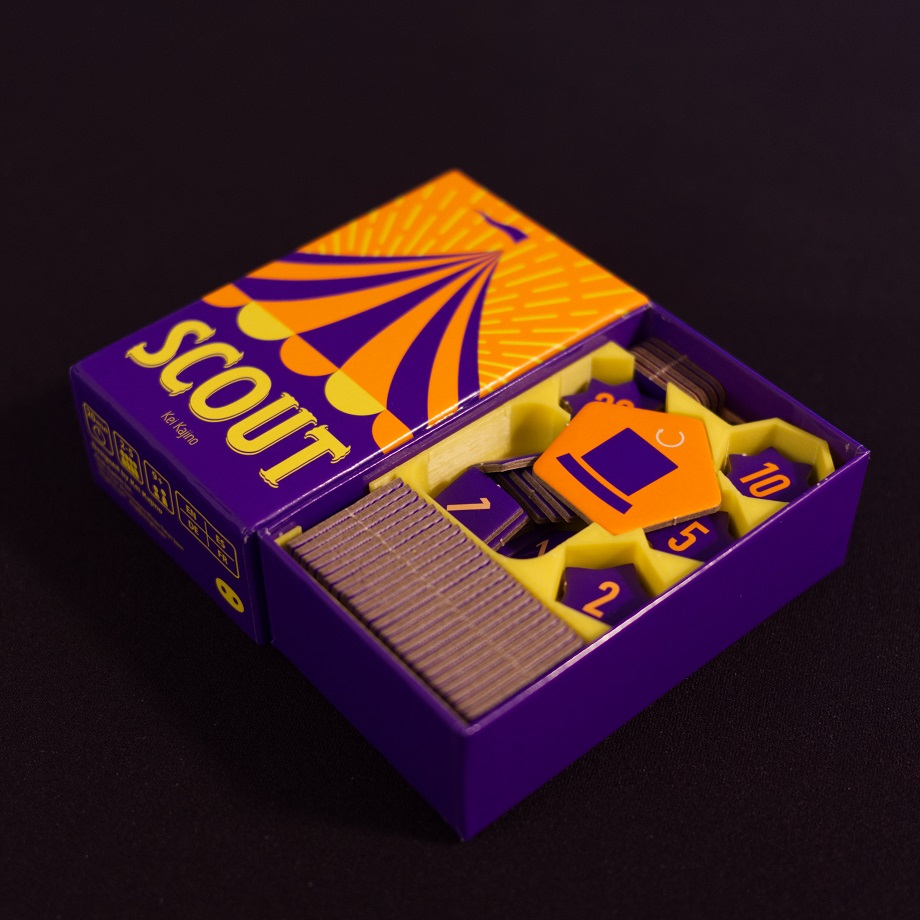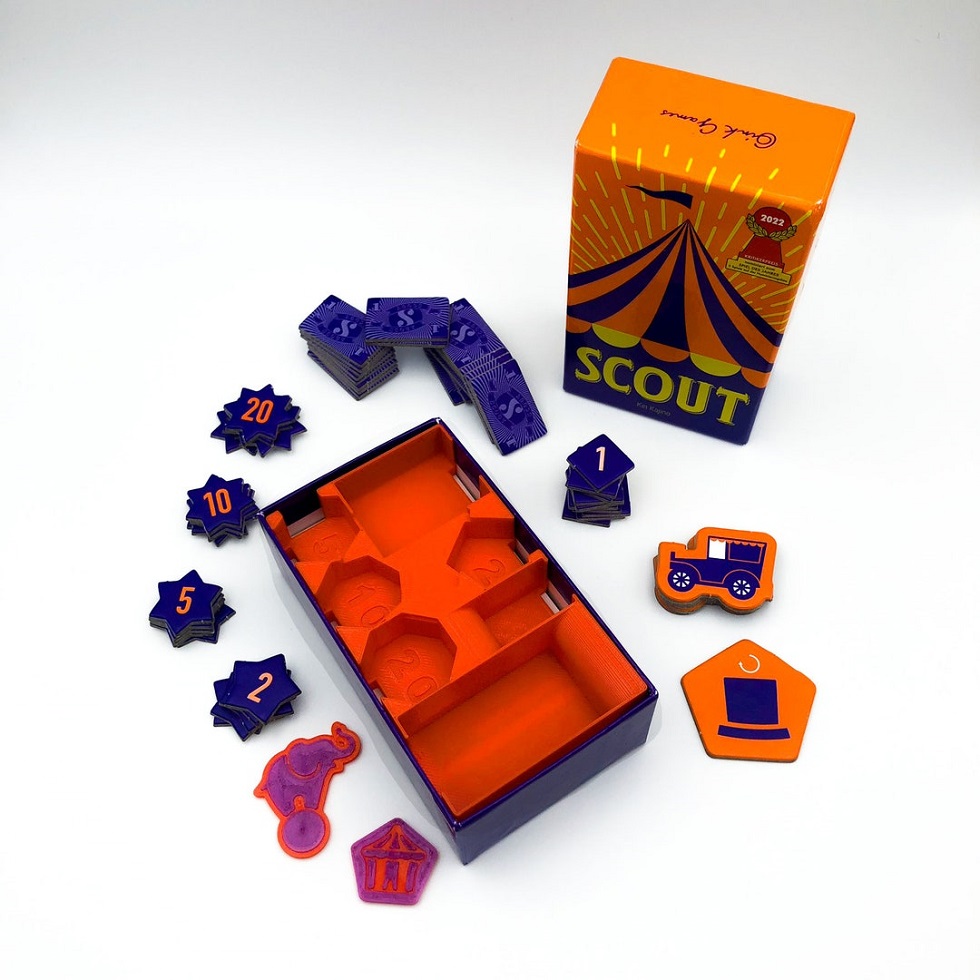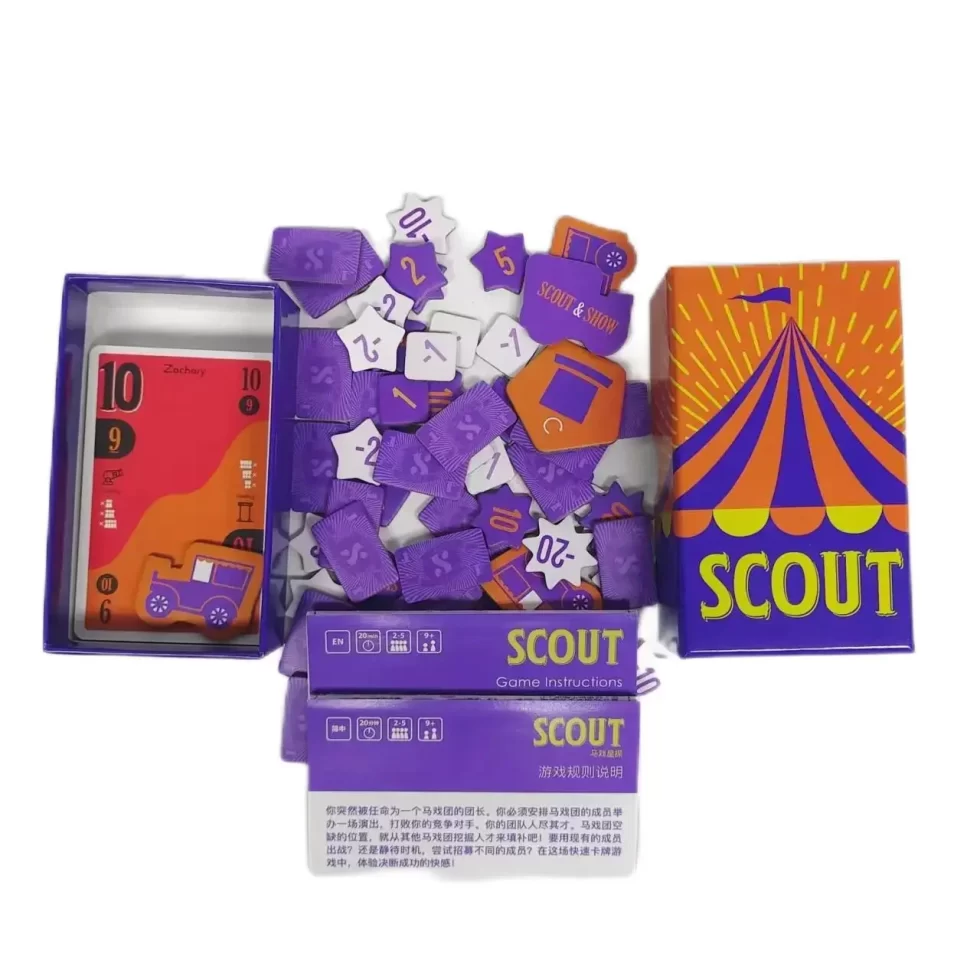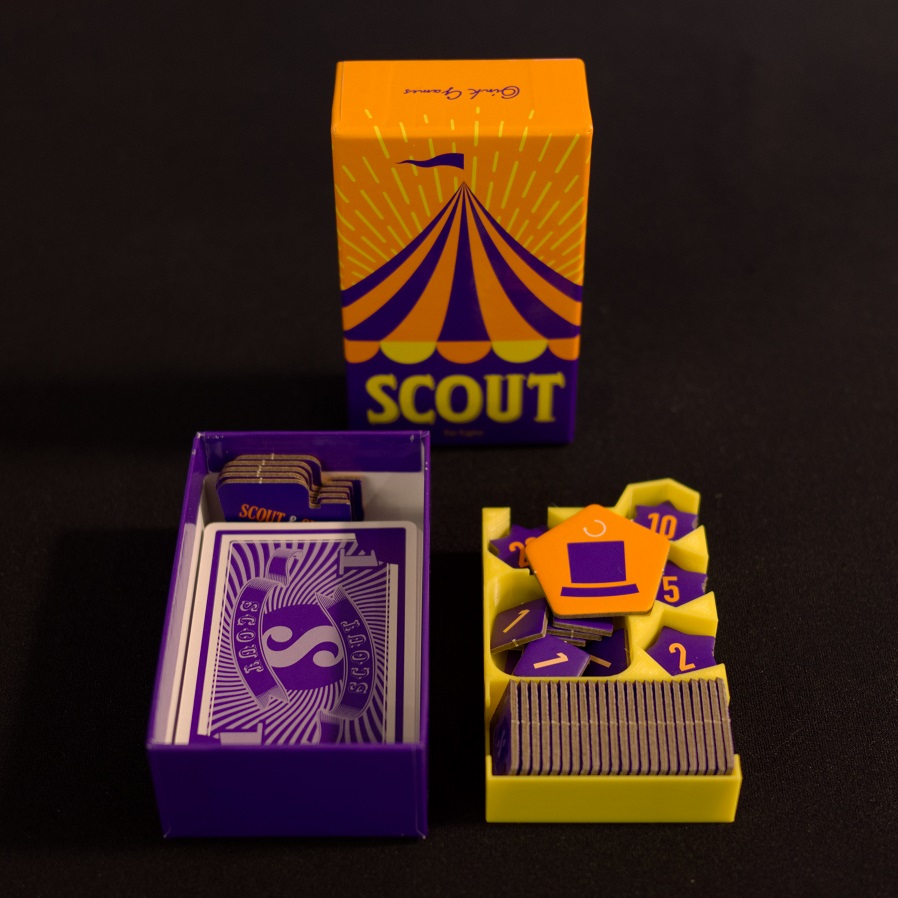Introduction to SCOUT Board Game
The SCOUT board game is a distinctive entry in the card game genre, heralding directly from Japan. Unique for its simplicity blended with deep strategic elements, it presents an engaging challenge that appeals to both casual and avid gamers. This game stands out due to its inventive use of card mechanics, which require a blend of strategy and quick thinking, making it a must-try for enthusiasts of ladder-climbing card games.
Japan’s Unique Contribution to Card Games
Japan has long been influential in the gaming industry, offering titles that often blend traditional gameplay with innovative mechanics. SCOUT is no exception, showcasing Japan’s capacity to push the boundaries of card game design. Its design reflects a meticulous attention to detail typical of Japanese game design, emphasizing strategic depth and replayability.
The Intriguing Game Mechanics of SCOUT
SCOUT introduces a refreshing twist to card games with its dual-numbered cards and the unique ‘card flipping’ feature. Players must strategically manage their hands, deciding when to play or scout cards to outmaneuver opponents. This dynamic adds a layer of complexity to the game, elevating it beyond typical card games and into a realm that challenges cognitive and strategic thinking.
Core Gameplay Experience
The SCOUT board game delivers a unique and engaging core gameplay experience. With its roots in Japan, the game has captivated a global audience through its simplicity and strategic depth. Players aim to outmaneuver their opponents using clever card play and timing.
Objective and Basic Rules Overview
In SCOUT, the goal is simple: empty your hand of cards first. Each turn, players have a choice: play a set of cards that outdoes the current set on the table or perform a scouting action. To succeed, players must create increasingly powerful combinations of cards. Strategy is key, as the gameplay relies on anticipating opponents’ moves and efficiently using available cards.
The Unique Element of Card Flipping
What sets SCOUT apart is the card flipping mechanic. Each card has two numbers, one on top and one on the bottom. When you pick up your hand, the order of the cards must stay fixed. This limitation means the hidden number on the bottom can suddenly become your active number if you choose to flip your hand. This twist adds an extra strategic layer, forcing players to plan ahead and consider the potential of both sides of their cards.
Playing Cards versus Scouting Actions
Choosing between playing cards and scouting is a tactical decision in the game. Playing cards can help you shed cards quickly and score points by collecting sets from the table. However, scouting allows you to improve your hand by adding a card from the current table set, albeit at the cost of giving your opponent a point token. Skilled players use scouting to set up future plays and disrupt opponents, making it an integral part of the strategy in SCOUT.
Strategies for Success
Timing Your Plays and Scouts Effectively
To excel in the SCOUT board game, sharp timing is essential. Watch the board and plan your moves. Play stronger sets when you can dominate, picking the right moment to lay down your cards. Use the scout action to strengthen your hand when you can’t outdo the current set. Remember, good timing keeps you one step ahead of opponents.
Maximizing the Use of the Scout + Play Token
The Scout + Play token is a game-changer. Use it wisely to make a pivotal play. Consider deploying it when it can disrupt an opponent’s strategy or safeguard your lead. But don’t hold onto it too long; it’s a one-shot tool, and there’s no bonus for saving it.
Understanding the Importance of Hand Management
Managing your hand is key to victory. Keep track of both numbers on your cards. Decide whether to stick with your current hand or flip for new options. A well-managed hand sets you up for strong plays and successful scouts, leading you towards winning the game.
Points System and Scoring
In SCOUT, scoring is straightforward yet crucial for victory. Each card or token you collect as points, and for each card left in hand, you lose points. A strategic balance between quick shedding and smart hand management can lead to a high score and overall win.
How to Score and Win
To win at SCOUT, gather more points than your opponents. Play higher card sets or successful scouts to accumulate cards and tokens, which count as your points. Each round ends when a player runs out of cards, or scouting actions can’t proceed. Tally the points for cards and tokens collected; subtract points for cards in hand. The highest score after the final round declares the game winner.
Dealing with the Element of Luck in SCouting
Luck can sway a game of SCOUT, as card distribution is random. Sometimes you may start with a strong or weak hand. But smart play can turn the tide. Use scouting to improve your hand or force an opponent to end the round early, balancing the scales of fortune in your favor.
Strategies to Mitigate Negative Points
Mitigating negative points is essential. Aim to play all your cards quickly. Use the Scout + Play token wisely to make a strong play or transform a weak hand. Plan your moves to minimize the number of cards left at round’s end. Scouting effectively can also reduce your hand, guarding against the loss of points. Each strategic move matters, influencing your final score and boosting your chances to clinch the game.
Common Challenges and Tips
Navigating the SCOUT board game can be daunting for new players. The game’s unique mechanics and strategic depth may initially create a steep learning curve. In this section, we outline some common challenges faced by beginners and provide actionable tips to overcome them.
Overcoming Initial Confusion and Learning Curve
At the outset, SCOUT’s dual-sided cards and fixed hand order might confuse players. Understanding these unconventional features is key to becoming proficient. To help new players:
- Take time to explain the dual numbers on the cards and the flipping rule.
- Do practice rounds to familiarize with the game’s flow.
- Use reference sheets during play to assist with rules and card strength.
- Emphasize the importance of card order and the inability to rearrange once in hand.
With practice, the initial confusion fades, giving way to a more intuitive play style.
Insights into Card Sequences and Their Strength
In SCOUT, card sequences can wield considerable power. Players often struggle to recognize the strongest combinations and their potential impact. To master card sequences:
- Study common card patterns that win rounds.
- Remember that sets of the same number trump runs (e.g., three fives beat a three, four, five).
- Realize the strength of four-in-a-row sequences as they can end hands quickly.
Knowing the strength of card sequences will enable you to play more strategically.
Tips for Minimizing the Impact of Luck
While luck plays a role due to random card distribution, strategy can mitigate its impact. Some tips include:
- Utilize the scouting action to improve weak hands.
- Reserve the Scout + Play token for critical plays that alter the game’s course.
- Stay adaptable; a game can swing dramatically with smart card play.
By following these tips, players can reduce the influence of luck and enhance their gameplay, leading to a more fulfilling SCOUT board game experience.
Enhancing Your Playthrough
Adapting to Various Player Counts
When playing SCOUT board game, consider the number of players involved. The game scales well, providing a compelling experience regardless of player count, but strategies may vary. With fewer players, scouting becomes more predictable, allowing for deeper strategy. In larger groups, anticipate more competition and chaos, which calls for adaptability and keen observation. Adjust your strategies to focus more on quick plays in larger groups, and in-depth strategic plays in smaller ones.
Game Variants for Different Gaming Experience
Exploring game variants can refresh the SCOUT experience. For example, introduce time constraints or hand limits to escalate the challenges. You can also try a variant where players can trade cards, injecting negotiation and diplomacy into the game. These variants not only increase replayability but also allow players to customize their experience according to their preferences and skill levels.
Protecting Your Game Components – The Card Sleeves Conundrum
Given that SCOUT cards may wear out with frequent use, consider protecting them with card sleeves. This not only extends the life of your game components but also ensures smoother shuffling and handling during play. Choose sleeves that fit snugly, as oversized sleeves can make handling awkward and detract from the game experience. Paying attention to the protection of your game components maintains the quality and longevity of your SCOUT board game.
Final Thoughts and Recommendations
SCOUT board game wraps ingenious strategy within its simple yet versatile card play. Having navigated through the intricacies of the game, let’s discuss who it suits best, evaluate its strengths and weaknesses, and contemplate why it would be a worthy addition to your collection.
The Game’s Appeal to Different Gamer Groups
SCOUT appeals to varied audiences. Its ease of learning draws in beginners, while depth entertains strategy buffs. Family gamers find it suitable for its quick rounds and ladder-climbing fun. For aficionados of Japanese games or those seeking portable gaming, SCOUT stands out.
The Pros and Cons of SCOUT Board Game
Pros:
- Engaging strategic depth.
- Unique card flipping mechanic.
- Portable and quick to play.
- Scales well for different player counts.
Cons:
- Can be luck-dependent.
- Cards may wear out quickly.
- Currently, it’s a Japan-only release, making it harder to get.
Why SCOUT Deserves a Spot in Your Game Collection
SCOUT merits inclusion for its distinctive gameplay and decision-making challenges. Its compact size makes portability a breeze. Despite the luck factor, strategic play ensures replay value. With card sleeves, durability concerns are managed. Elevate your gaming repertoire with this innovative card game that promises both fun and thought-provoking play.



